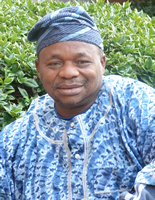
Kasali Akangbe, the 2013 Africana Artist-in-Residence, will present a series of public lectures as part of his campus visit.
On Wednesday, Feb. 20, Akangbe will discuss “How We Saved Osun Grove: The Art of Preservation in Nigeria’s Sacred Forest” at 5 p.m., in Fretwell Building, Room 405.
At 9:30 a.m., Wednesday, Feb. 27, he will present “What Does It Mean to be an Artist in Nigeria Today?” in Denny Building, Room 106. Later that day, at 3:30 p.m., Akangbe will talk about “The Importance of Art in Yoruba Healing and Health Practices” in Macy Building, Room 207.
On Tuesday, March 12, Akange’s exhibition “A Yoruba Artist’s Vision of Diverse Faces and Linked Destiny” will open at 2 p.m. in Garinger Building, Room 113.
Akangbe is a master woodcarver, structure designer, folklorist and environmental activist from Nigeria and is a founding member of the Osogbo New Sacred Art School. This art movement is credited with the invention of a neo-modern form in Yoruba art during the 1960s, and for using this form as part of the aesthetic, religious and political strategies for the preservation of the 420-year-old Osun Sacred Grove. This UNESCO World heritage site in Nigeria is the largest protected sacred grove in Africa.
The Africana Studies Department, in collaboration with the College of Arts + Architecture and with the support of the College of Liberal Arts & Sciences, initiated the Africana Artist-In-Residence program in 2009. The program’s goal is to showcase the work of artists and art critics whose original perspectives and creative energy advance a deep understanding of the experiences of Africana peoples worldwide.
The 2013 Africana Artist in Residence is funded through a UNC Charlotte Chancellor Diversity Challenge grant, with additional support of the College of Liberal Arts & Sciences, the College of Arts + Architecture, the Office of International Programs, Atkins Library’s Special Collections, Organization of African Students at UNC Charlotte, the Harvey B. Gantt Center for African American Arts and Culture and the Council for the Advancement of Yoruba Studies.